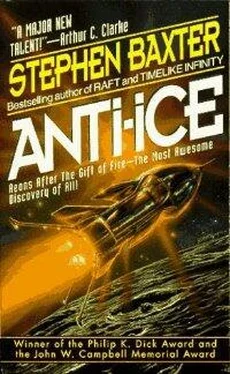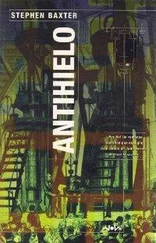“Retire!” He sounded shocked. “My boy, look yonder: those are the lights of Ostend. You forget you live in the Age of Miracles, Ned; we have arrived! Come now; I think we should down fresh coffees before we land and begin our forlorn search for a hansom…”
With the softest of sighs the train began to slow.
We spent a few days in Ostend. Then we traveled on to the landlocked construction site of the Prince Albert, which lay some eleven miles south of Brussels.
En route our Light Rail arced from north to south over the Belgian capital, following the line of the land railway. We peered down at the Domaine Royale’s sylvan expanse and swept over the bristling roof of the Gare du Nord, the main rail station. Brussels, in the bright sunlight, had something of the look of a medieval painting: elegant, golden and ornate, and full of color and life.
At last we slid over the Parc du Bruxelles, a pocket handkerchief of green and white spread out over the breast of the city, and moved on south away from the city.
The countryside to the south was green, quaint and almost English—amid which the Prince Albert graving-yard, which soon came sliding over the horizon, was a startling splash of cobbles, rusty iron and oil.
At about six in the evening we arrived at the land dock terminus. The velvet-clad girths of a party of matrons preceded us down the Mechanical Staircase to the ground, and Holden and I were amused to observe these ladies picking their way through the mud and rust of a dockyard, their hems swishing through oily puddles.
The launch of the Albert was scheduled for noon of the next day, and Holden and I summoned a hansom to take us to our inn. The hansom jolted over roughly cobbled roads, and we peered out, bemused. A veritable makeshift city had grown up around the graving-yard—a city constructed of untarred timber, corrugated iron and cardboard, but a city nonetheless. The lanes were lined with pubs and gin houses, already doing a roaring trade despite the earliness of the evening. The ale being quaffed in great quantities was clearly of the heavy, dark English kind. There was something of the atmosphere of a county fair: tumblers rolled endlessly across our path, and we noticed a Punch and Judy stand that might have been brought nail by nail from the East End entrancing a group of children well-dressed enough for nobility; there were notices for exhibitions of such novelties as the Six-Legged Sheep and the Human Arithmometer; and everywhere there was the smell of hot chestnuts, toffee apples and sweetmeats, the bray of the hurdy-gurdy and the roundabout, and the discordant piping of penny whistlers.
“Good Lord, Holden,” I said, exhilarated by it all, “it’s scarcely like Belgium at all. It’s more like the blessed Isle of Dogs.”
His small eyes twinkled. “There speaks the cosmopolitan diplomat. And what would you be seeking in the Isle of Dogs, young Ned, eh?” I fear I blushed, but he held up a pudgy hand. “Never mind, lad; I was young once too. But you should scarcely be surprised. The Prince Albert is the first land cruiser, intended to sail the plains of northern Europe, but she is an English ship—designed by English naval architects, fitted out by English engineers, and built by English shipwrights. And so a square mile of Belgian soil has become an annex of the East End of London. This is an English colony, lad; a symbol, perhaps, of our technological dominance of Europe.”
Now we came to the center of this bustling community. Here, the taverns and boarding-houses clustered thick around a strange hillock. This grass-covered cone of earth, clearly artificial, rose some 150 feet high. At the peak of the mound rested a stone lion, his paw resting on the globe of Earth, his gaze fixed on the distance.
Again there was a faintly disturbing edge to Holden’s voice. “And here is the Butte du Lion, Ned; the Lion Mound. Built of soil carried from the battlefield in baskets and sacks by the grateful natives, so that our famous victory could be marked for all time.” He gazed up at the noble stone beast, his lower lip working.
And I, too, studied the lion with some awe and tried to imagine that June day a half-century earlier when, not yards from this spot, Wellington had at last faced down the Corsican…
For this was, of course, the village of Waterloo; and what more fitting place could there be to build this new symbol of British triumph? (Even though, I reflected, the English army had that day needed the bold intervention of the Prussians to beat off the rampant French. I forbore to mention this to Holden, however.)
Now Holden leaned forward and pointed with the stem of his pipe. “Look there…”
That new monument, the land liner, bulked on the western horizon, silhouetted against the setting sun. It was a carcass which loomed out of a sea of shanty dwellings, and it bristled with scaffolding and tarpaulin. Electric arcs illuminated the scaffolding; by their light workmen swarmed like ants.
Holden’s voice was gruff, almost as if he were close to tears. “What a sight, Ned. What must these continentals think of such projects? They are like the peasants of the Middle Ages who gazed, straw dangling from their slack jaws, at the soaring lines of the great Gothic cathedrals.”
I was about to remark that if we could find a Belgian in this collection of Cockneys then we could perhaps consult him on the issue—when a sound descended from the sky, a roar so powerful it felt as if the palm of God’s hand were pressing down on the roof of the hansom. Our horses bucked and whinnied, jolting the cab.
A light passed slowly over us, white and fiercely bright, drawing knife-sharp shadows across the makeshift landscape.
Silence spread among the revelers. The light passed beyond the bulk of the Albert and settled behind it, eclipsing the sunset.
“Dear God, Holden,” I breathed. “What was that?”
He grinned. “Sir Josiah Traveller, Fellow of the Royal Society, aboard his air-brougham the Phaeton,” he said with a flourish.
I stared at the fading glow.
Around us the noise of the city flowed back as water scooped away returns to its container, and our hansom jolted into life once more.
* * *
Our hostel was run by a native Belgian. The place was small and shabbily furnished, but it was clean, and the food was plain, wholesome—in the English style—and plentiful.
We had an early night and, at eight on the morning of the launch day, the eighth of August, we set off in our finery for the Prince. Our hostel was perhaps two miles from the ship itself, and I made to call a hansom; but Holden advised against it, pointing out that it was a fine morning and a walk might clear our heads.
And so we picked our way through the oily, litter-strewn streets of the Prince Albert land dock. Ale- fueled revelry was already in earnest, despite the earliness of the hour—or perhaps, Holden said, it had not ceased since the previous night. It was like a large, impromptu party; we saw well-dressed city gentlemen pushing shillings across bars to buy beer for grimy shipwrights, while ladies of all classes mingled with astonishing abandon. As we walked through streets lined with laughing faces the blood pumped through my veins and my spirits rapidly picked up.
We turned a corner, and the ship hove into view.
I gasped. Holden drew to a halt and hitched his thumbs in the bright cummerbund around his waist. “Now, there’s a sight. Would you have wanted to come upon such a spectacle from the poky confines of a hansom, Ned?”
The great land cruiser had been shorn of its restraining tarpaulins and scaffolding, and now it rested on the flat Belgian landscape like some huge, unlikely beast, hedged about by cranes and gantries.
Читать дальше












